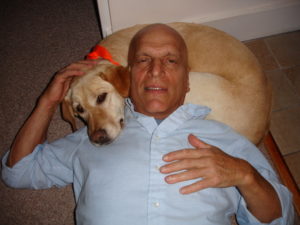In 2007, a month after Vic’s stem cell transplant, he drives our Subaru west on the New York State Thruway. I’m in the passenger seat, watching his jaw muscle pop.
“Let’s make a list,” I suggest.
“I hate lists,” Vic complains.
I know that when we’re sitting in an exam room with Vic’s oncologist hearing blood work and scan reports, we forget the day-to-day symptoms, weird side-effects, and constant aches and hurts. We forget to ask the questions that explode into consciousness at 3 am and chase away sleep.
What can we do about Vic’s foot cramps and swollen legs and hands? Is it OK to get his teeth cleaned? Can we stop sterilizing everything in the kitchen?
Vic drives in the slow lane, using the cruise control. Flapping windshield wipers turn salty splats from passing trucks into arching streaks. Today, we’ll get the results of recent blood work. Vic usually drives the two hours to Strong Memorial Hospital in Rochester for appointments and chemotherapy while I drive home. I’m not sure it’s safe for him to be behind the wheel, but driving is a last vestige of power and he doesn’t want to give it up.
“What do you want to ask Dr. Fisher?” I prompt. The overriding question—what is the lymphoma doing?—may not have an answer, but I’m hoping for symptom relief.
“I want to know when I can stop taking that disgusting yellow anti-bacterial stuff.” He pauses. “I want to know what to do about my numb feet and itching skin.”
I write his concerns down and wait. After a few minutes, I ask, “Anything else?”
“Yeah, when will my hair grow. I’m cold.” He shoots me a teasing sideways glance and grins. I reach over and caress his thigh.
We turn on to 390N, closing in on the hospital, when I see red flashing lights behind us and hear a screaming siren. Vic groans, slows down, and pulls over. A police car tucks in behind us. Vic rolls down his window as the uniformed cop strides up to the car like a gunfighter, pelvis forward, shoulders close to his ears, and arms lifted out to the side.
“What is it you don’t understand about construction zone signs?” the cop growls.
“Sorry, officer,” Vic says. “I thought I was going under the speed limit.”
“It’s 45 miles an hour here and you’re going 57. What’s your hurry, buddy?” the policeman asks.
“Ummm…” Vic hesitates. “I have a doctor’s appointment at Strong to find out if I still have cancer in my body. I’m sorry I didn’t see the construction signs.”
The cop leans down, sticks his jowly face through the open driver’s side window, and looks into my eyes.
“Do you drive?” he asks.
“Sure,” I say.
“Well, then, get in the driver’s seat.” He opens the car door for Vic, while I scramble over the hump between the seats and adjust the mirrors. Through the rearview mirror, I see the two men speaking and nodding to one another. Then, the cop shakes Vic’s hand.
“What did he say?” I ask when Vic gets into the passenger seat.
“He said, ‘Good luck, buddy. I hope you get good news. And please let your wife drive.’”
***
For more of my articles, please visit the bereavement section of my website. You might also be interested in articles about nutrition and complementary therapy during cancer treatment and exercise during cancer therapy.

I teared up, reading this…
Thanks for feeling this experience with me, Christi. Moments of kindness and love permeated the harsh world of cancer treatment. At the time, it helped to notice and write about these small gifts. It still helps.
Christi already said what I was going to say, so all I have left is, I’m touched and inspired by your determination to be present with every detail of this experience. It’s a gift to the rest of us, many of whom will go through the same thing one day. Jeanie
Thank you, Jeanie. During Vic’s illness, our allies were the Dalai Lama’s practice of kindness along with honesty about our vulnerability. When we admitted our suffering to others, love showed up. It still does.
so glad you can write about this Elaine. you allow us to feel everyone’s humanity.
xxoo
Thank you, Eve. Writing allows me to feel my own heart and humanity, too.
I cried reading this, Elaine. Thank you so much!
My husband, Adrian, also wanted to keep driving past the time when he probably should have. These things are always difficult.
Lynne
Thanks, Lynne. I wonder how I will do when it’s my time to give up driving. I frequently drive in my dreams–my symbol for being in control or out of control. After Vic died, I had many dreams of broken or stuck cars and accidents. Fortunately, my life seems to be staying on the road now.
The other kind commenters have said it, brought me tears as well. I want to put in a line for the writing itself–a jump in the power of its expression. Potent. Thank you.
Thank you, Fred, for your support about the topic and my writing. I am practicing my skills, that’s for sure.